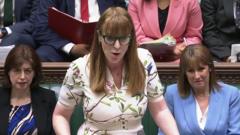Will the Welfare Vote Proceed Despite Rebellion? Rayner Weighs In!

Understanding the Political Landscape Surrounding the Welfare Bill
In recent weeks, the UK Parliament has been embroiled in a heated debate surrounding a new welfare bill proposed by the government. The bill, which aims to redefine eligibility for various disability and sickness benefits, has met with considerable opposition from within the Labour Party and raised questions about its potential impact on vulnerable populations. With over 130 MPs, including a significant number of Labour backbenchers, expressing their dissent, the outcome of the upcoming vote could have far-reaching implications for both the government and those relying on welfare support.
The Stakes of the Vote
As the vote looms closer, the pressure is mounting on Deputy Prime Minister Angela Rayner to defend the government's position. In the Commons, Rayner has asserted that the welfare bill will help people transition into work while ending eligibility reassessments for the severely disabled. This claim, however, is met with skepticism, particularly from Labour critics who argue that the bill lacks a comprehensive assessment of its potential consequences.
Key Components of the Welfare Bill
The core provisions of the Universal Credit and Personal Independence Payment Bill aim to:
- Redefine who qualifies for certain disability and sickness benefits.
- Reduce the welfare budget in an effort to control spending.
- Encourage more people to enter the workforce.
While these objectives may sound promising, the implementation of such changes raises concerns about accessibility and the potential for increased poverty levels among vulnerable populations. Labour MPs have voiced their worries, emphasizing that the bill could inadvertently force many individuals deeper into financial hardship.
Opposition from Within the Labour Party
The dissent within Labour ranks is significant, with over 120 backbenchers signing an amendment calling for the bill to be scrapped. This internal conflict highlights the divisions within the party and raises questions about the leadership’s strategy moving forward. Shadow Chancellor Sir Mel Stride has been vocal in his criticism, questioning Rayner’s ability to justify the bill in light of the strong opposition from her own colleagues.
Arguments For and Against the Bill
Supporters of the bill, including key government figures, argue that:
- It will streamline welfare processes and reduce unnecessary bureaucratic hurdles.
- It is essential for curbing the rise in benefit claimants, thereby stabilizing the welfare budget.
- It will create a more efficient system that encourages employment.
Conversely, critics of the bill contend that:
- There has not been adequate assessment of the bill's impact on low-income families and individuals with disabilities.
- The changes could lead to an increase in poverty, pushing vulnerable groups further into economic despair.
- There is a lack of clear evidence supporting the claim that the bill will effectively reduce the welfare budget without adversely affecting those in need.
The Role of Senior Ministers
In an effort to bolster support for the bill, senior ministers, including the Chancellor and Health Secretary, have been reaching out to Labour MPs in hopes of swaying their opinions. This strategy underscores the government's recognition of the potential for an embarrassing defeat, which could reshape the political landscape and serve as a setback for Prime Minister Rishi Sunak’s administration.
Speculation of a Pullback
Given the mounting opposition and the potential for a significant loss, speculation arises about whether the government will decide to pull the vote altogether. Rayner has firmly stated that the vote will proceed as planned, suggesting that the government is confident in its position. Yet, the reality remains that numerous Labour MPs have articulated their commitment to opposing the bill.
Criticism from Other Parties
The Liberal Democrats have also entered the fray, with their deputy leader, Daisy Cooper, pressing Rayner for assurances that no individual would lose any financial support until a thorough review of the Carer's Allowance overpayment issue has been completed. The scrutiny over past overpayments, which affected over 134,000 carers, has further complicated the situation and drawn attention to the need for a more considerate approach to welfare reform.
Rayner’s Defense and Future Implications
In her defense, Rayner emphasized the government's commitment to reforming a welfare system that she claims is failing many. She attacked the Conservatives for lacking a coherent welfare strategy, positioning the bill as a necessary step towards reform. However, her ability to sway both her party and the general public remains uncertain, especially with the looming vote and the divided sentiments within Labour.
The Broader Context of Welfare Reform in the UK
The debate over the welfare bill is not merely an isolated incident but rather part of a larger context of welfare reform in the UK. The welfare system has long been a contentious issue, with various governments attempting to balance fiscal responsibility with the need to support vulnerable populations. As the economic landscape shifts, the challenges surrounding welfare policies become even more pronounced, making it crucial for policymakers to navigate these waters carefully.
Implications for Future Policies
The outcome of this vote may set a precedent for future welfare policies and the government's approach to social support systems. Should the bill pass, it could signal a shift towards more stringent welfare measures, impacting millions of citizens. Conversely, a defeat could compel the government to reconsider its strategy and engage more meaningfully with opposition voices.
Conclusion
The upcoming vote on the welfare bill encapsulates the complexities and tensions inherent in UK politics today. With strong opposition from within Labour and questions about the bill's efficacy and ethical implications, the stakes are high. The government must tread carefully as it seeks to implement reforms that address both fiscal concerns and the needs of its most vulnerable citizens.
As this situation unfolds, it prompts a critical reflection on the role of welfare in society and the responsibilities of government to its people. Will the government find a way to balance budgetary constraints with the need for compassion and support? The outcome of this vote will undoubtedly have lasting effects on the welfare landscape in the UK.
Frequently Asked Questions
What is the main purpose of the welfare bill proposed by the government?
The welfare bill aims to redefine eligibility for disability and sickness benefits, streamline the welfare process, and reduce the overall welfare budget while encouraging people to enter the workforce.
Why are Labour MPs opposing the welfare bill?
Many Labour MPs believe the bill lacks sufficient assessments of its impact, fearing it could push vulnerable individuals deeper into poverty and create unnecessary hardships for those reliant on welfare support.
What are the potential consequences if the welfare bill is passed?
If the bill is passed, it may lead to stricter eligibility criteria for benefits, potentially increasing financial strain on those already facing economic difficulties. It could also set a precedent for future welfare reforms.
What has Deputy Prime Minister Angela Rayner said in defense of the bill?
Rayner has argued that the bill will help individuals transition into work and end unnecessary eligibility reassessments for severely disabled people, positioning it as a crucial reform for an outdated welfare system.
How has the Liberal Democrats responded to the welfare bill?
The Liberal Democrats, particularly Deputy Leader Daisy Cooper, have called for guarantees that no individuals would lose financial support until a review of the Carer's Allowance overpayment issue has been completed.
The political landscape surrounding the welfare bill is complex and fraught with implications for the future of welfare in the UK. As discussions continue, it raises essential questions about the government's commitment to supporting its citizens while managing economic challenges. How do you think the government should balance fiscal responsibility with social support? #WelfareReform #UKPolitics #SocialSupport
Published: 2025-06-25 12:46:04 | Category: sport



